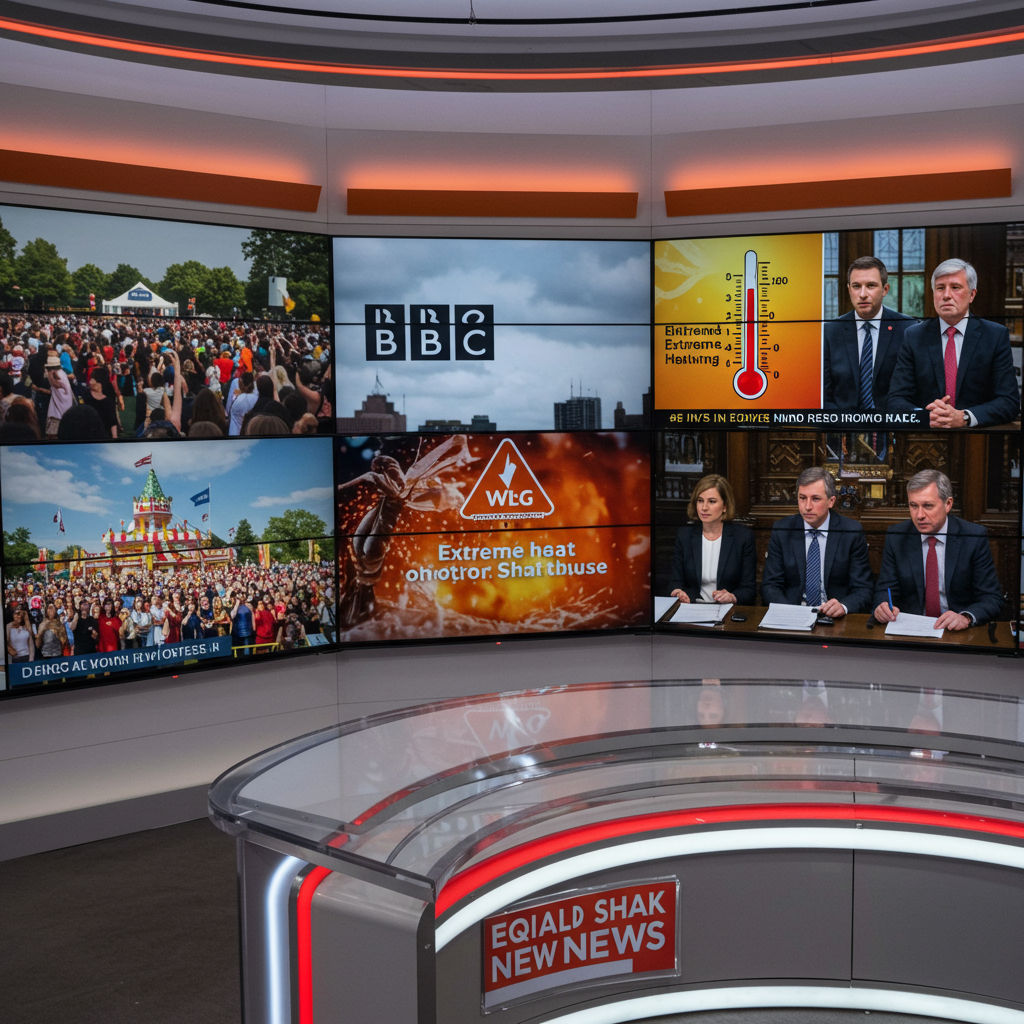Dive into today’s top UK headlines, where controversy grips the BBC over a glastonbury Festival broadcast, political tensions simmer in Westminster, and the country braces for record-breaking heat. Major newspapers lead with the fallout from explicit chants aired during a livestream and the challenges facing the labour leadership on a key welfare bill. Meanwhile, health news and weather warnings also feature prominently across the press. This article unpacks the key stories shaping the national conversation.
BBC Under Fire Over Glastonbury Broadcast
The British Broadcasting Corporation (BBC) faces intense scrutiny following the airing of controversial chants during a livestream of punk duo Bob Vylan’s performance at Glastonbury Festival. The incident, involving chants of “death, death to the IDF,” has ignited widespread condemnation from various quarters. Both the public broadcaster and the music festival organisers have drawn criticism for allowing the content to be broadcast live.
Newspapers across the UK are leading their coverage with the row. The Daily Express starkly questioned, “Why did BBC not pull plug” on the performance, highlighting the significant backlash faced by both the festival and the BBC. The Daily Mail’s front page carried a provocative headline suggesting “BBC chiefs ‘should face charges'” over the incident. It quoted Shadow Home Secretary Chris Philp, who asserted that the BBC “appears to have broken the law.” The Daily Telegraph also prominently featured Philp’s comments, noting his controversial comparison of the “hate rapper” to Lucy Connolly. Connolly received a 31-month prison sentence after admitting to inciting racial hatred via a social media post following the Southport killings. Philp argued that failing to treat the Glastonbury situation similarly would be “a clear example of two-tier justice under Sir Keir Starmer.”
Political and Official Reactions
The controversy quickly drew reactions from senior political figures. According to The Sun, Prime Minister Rishi Sunak commented on the issue, stating that “the BBC needs to explain how these scenes came to be broadcast.” The Metro reported that Health Secretary Wes Streeting also “waded into” the debate. While condemning the chants themselves as “inflammatory and hateful,” a label used by the Israeli Embassy, Streeting reportedly added a pointed remark telling the embassy to “get your own house in order in terms of the conduct of your own citizens and the settlers in the West Bank.” The Times newspaper added to the pressure on the broadcaster, reporting that a BBC boss has been told they must “get a grip or quit” in the wake of the controversy.
The BBC itself has issued a statement regarding the incident. A spokesperson acknowledged that some of the comments made during the performance were “deeply offensive.” They confirmed that the broadcaster had displayed an on-screen warning to viewers about the presence of “very strong and discriminatory language” during the livestream. Importantly, the BBC spokesperson added that there are currently no plans to make the controversial performance available for viewing on its catch-up service, iPlayer.
Labour Leadership Faces Welfare Bill Showdown
Beyond the cultural storm surrounding the BBC, political tensions are also dominating headlines, particularly within the Labour party. Prime Minister Sir Keir Starmer is reportedly facing a potential “backbench showdown” over a proposed welfare bill. This internal party challenge comes despite recent efforts to amend the legislation. Today, the Prime Minister is expected to make a “last-ditch bid to woo” rebellious Labour MPs in an attempt to secure support for the bill.
Analysis from the Financial Times highlights the financial implications of the proposed changes to the welfare bill. It reports that modifications have significantly reduced the expected government savings, dropping from an initial estimate of £5bn down to approximately £2bn. The newspaper describes the uncertainty surrounding the outcome of a potential vote on the bill as “highly unusual.” This level of unpredictability suggests “tensions and bad blood within the Labour party,” according to the FT’s reporting.
Rebel Demands and Political Divisions
Other newspapers also zero in on the political challenge facing Starmer. The Times reports that the “PM battles to stave off revolt” within his own party over the planned welfare cuts. The Guardian focuses specifically on the demands being made by Labour rebels. Its headline notes that a “Rebel Labour whip calls for more welfare concessions.” The paper quotes Vicky Foxcroft, who previously resigned as a whip over the bill, outlining the demands. She told The Guardian that the government must work collaboratively with disabled people on any proposed changes and commit to publishing a review of the bill’s impact. The differing angles taken by these newspapers underscore the depth and complexity of the internal divisions facing the Labour party on this significant policy issue.
Other Notable News Across the UK Press
While the BBC controversy and Labour’s political struggles dominate many front pages, other significant stories are also capturing public attention.
Health and Weather News
In health news, The i newspaper reports on a new government “obesity plan” that aims to make “NHS weight-loss jabs” more accessible. The report states that these jabs will now be available directly “from your pharmacy.” Health Secretary Wes Streeting is quoted expressing his ambition for everyone who is clinically obese to be able to receive these jabs on the NHS if they are deemed necessary. This marks a significant step in the government’s strategy to tackle rising obesity rates.
Meanwhile, the weather is making headlines as the UK anticipates exceptionally high temperatures. The Daily Star dramatically declared it is “meltdown Monday” as a result of a “2000 mile-wide 35C heat bubble” prompting many people to head to beaches. Similarly, The Daily Mirror announced the “Heat is on,” reporting that Monday is forecast to be the “hottest day of the year” in the UK. These reports highlight the immediate impact of the heatwave on public life and daily routines.
Other Brief Mentions
Beyond the major stories, several other items received brief mentions or features. The start of the prestigious Wimbledon tennis tournament was noted by The Times. The Daily Mail also touched on the world of tennis, featuring British women’s pair Emma Raducanu and Katie Boulter and asking if they would “ace it for Britain at SW19,” referring to the location of Wimbledon. The Financial Times front page also included a note about a fascinating scientific development: a Cambridge laboratory is reportedly working on creating a “biological computer” constructed using 200,000 human brain cells they have successfully grown. These diverse headlines reflect the varied news agenda covered by the UK press today.
Frequently Asked Questions
What was the controversy involving the BBC and Glastonbury?
The controversy centred on the BBC’s livestream broadcast of a performance by punk duo Bob Vylan at Glastonbury Festival. During their set, chants of “death, death to the IDF” were aired, leading to widespread condemnation. Critics questioned why the BBC did not stop the broadcast or pull the performance. The BBC acknowledged the comments were “deeply offensive” but stated they had shown an on-screen warning. They confirmed the performance would not be put on iPlayer.
Which politicians commented on the BBC Glastonbury incident?
Several prominent politicians reacted to the BBC Glastonbury controversy. Shadow Home Secretary Chris Philp suggested BBC chiefs should face charges and claimed the broadcaster appeared to have broken the law. He controversially compared the performer to an individual jailed for inciting racial hatred. Prime Minister Rishi Sunak called on the BBC to explain the broadcast. Health Secretary Wes Streeting condemned the chants but also criticised the Israeli Embassy regarding the conduct of settlers in the West Bank.
What are the main issues facing Keir Starmer regarding the welfare bill?
Sir Keir Starmer is reportedly facing significant opposition from Labour backbench MPs over a proposed welfare bill. The bill’s planned changes have reduced expected government savings. Starmer is attempting to win over rebels. The situation is described as creating unusual uncertainty and suggesting internal party “tensions and bad blood.” Rebel MPs, including former whip Vicky Foxcroft, are demanding more concessions, collaboration with disabled people on changes, and the publication of a review.




